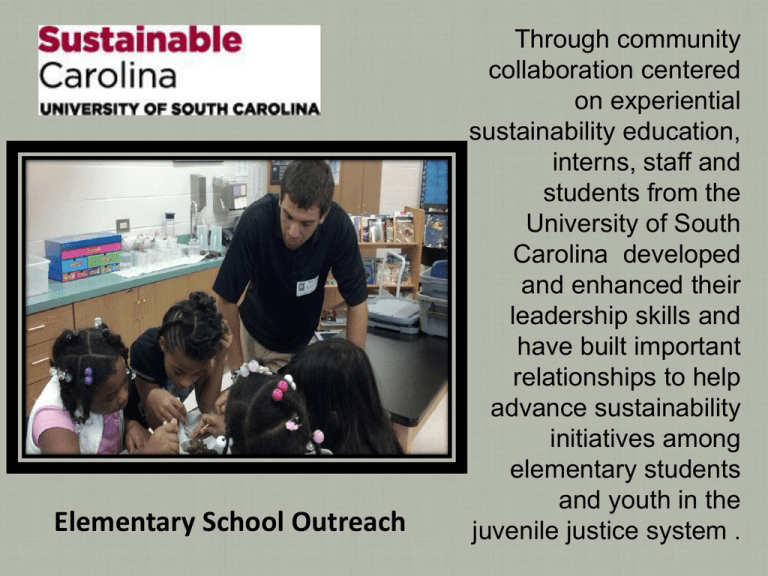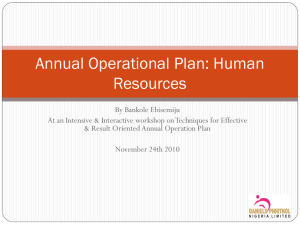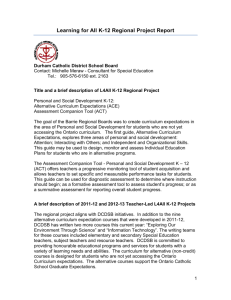Student Lead Environmental Education Outreach
advertisement

Elementary School Outreach Through community collaboration centered on experiential sustainability education, interns, staff and students from the University of South Carolina developed and enhanced their leadership skills and have built important relationships to help advance sustainability initiatives among elementary students and youth in the juvenile justice system . Multiple Goals • Increase the leadership skills within the studentinterns, advocates and course participants • Increase the amount of resources focused on nutrition, gardening and sustainability to use as outreach for K-12 students • Increase relationships with organizations that serve marginalized youth* to further their exposure to programs that promote nutrition, gardening and sustainability (*Youth in the criminal justice system, ethnic minorities and students at struggling schools) Projects with Adjudicated Youth Nutrition & Sustainability Education • University student-interns, Green-quad staff, students of our environmental service learning courses and volunteers, both graduate and undergraduate, developed sustainability-focused education modules that were then delivered in local schools. • These schools range from incarcerated youth within the Department of Juvenile Justice, to 2nd-5th graders at local elementary schools in Richland County Farm to School/ Gardening/ Nutrition with DJJ Campuses • Through their participation in this program, student-interns and student-advocates are developing leadership skills and ability to teach sustainable practices, therefore increasing their potential to serve as beacons of sustainability upon graduation. • Additionally they are promoting sustainability to the next generation- providing a deeper since of engagement on behalf of the K-12 students & incarcerated youth Engaging USC Students & Advocates Advocate Training @ Sustainable Carolina • Project Teams- K-12 Curriculum Outreach, Food Justice & Garden teams • Students of our service learning courses- Green Politics, Politics of Local Food, • Service learning projects • Community Collaboration with Project Learning Tree/ Richland County Conservation Sustainable Carolina/ Green Quad Educational Programs to date – • Collaboration with summer camp through the College of Public Health “Columbia’s Cooking” – two months during the summer of 2013 • # of k-12 Students reached:110 • # of university students reached: 6 • # of university staff/faculty engaged: 3 Green Quad Based Summer CampGLEA* • Two weeks of summer day camp focused on sustainability, photography and literacy delivered during the summer of 2013 • # of K-12 students reached: 15 • # of University students reached: 2 • # of University staff/faculty: 4 Educator & Advocate Training • Full day training of Project Learning Tree Curriculum and vermi-compost training by community collaborators from Richland Soil and Water Conservation • # of educators/advocates engaged: 18 • # of University faculty engaged: 2 • # of Community Collaborators engaged: 2 Green Job Skills- DJJ Students • # of K-12 students reached: 75 • # of University students reached: 5 • # of University staff engaged: 1 • # of educational professionals engaged: 6 • Curriculum provided as part of Farm to School Grant- Birchwood Campus Elementary School outreach: • 4 local elementary schools host programs developed by university interns, advocate volunteers including gardening, composting and habitat-protection activities • # of K-12 students reached: 93 • # of university students reached: 10 • # of teachers engaged: 10 Program Benefits Contributions • The contributions of the university-students to the learning communities at participating schools is also evident on behalf of the participating schoolbased educators and collaborators that have worked with our interns. From the teachers: “By inviting university students into the classroom, we gain an injection of new ideas, passions, abilities, and knowledge.” “By participating in this program, I can better engage my students about the environment, sustainability and health in a hands-on way” USC Intern/Advocate Experiences • One participating • A second student university involved with undergraduate detailed elementary students that these K-12 details that “we learn sustainability outreach how difficult it is to make programs to be a “fun a curriculum and we way to learn about see/learn hands on how gardening, to work with kids learn things and kids, and to learn about how to properly present qualitative research the material for the kids methods” to best understand it and use it.” Thanks for your attention Autumn Perkins K-12 Curriculum Outreach Sustainable Carolina AutumnPerkins@gmail.com






